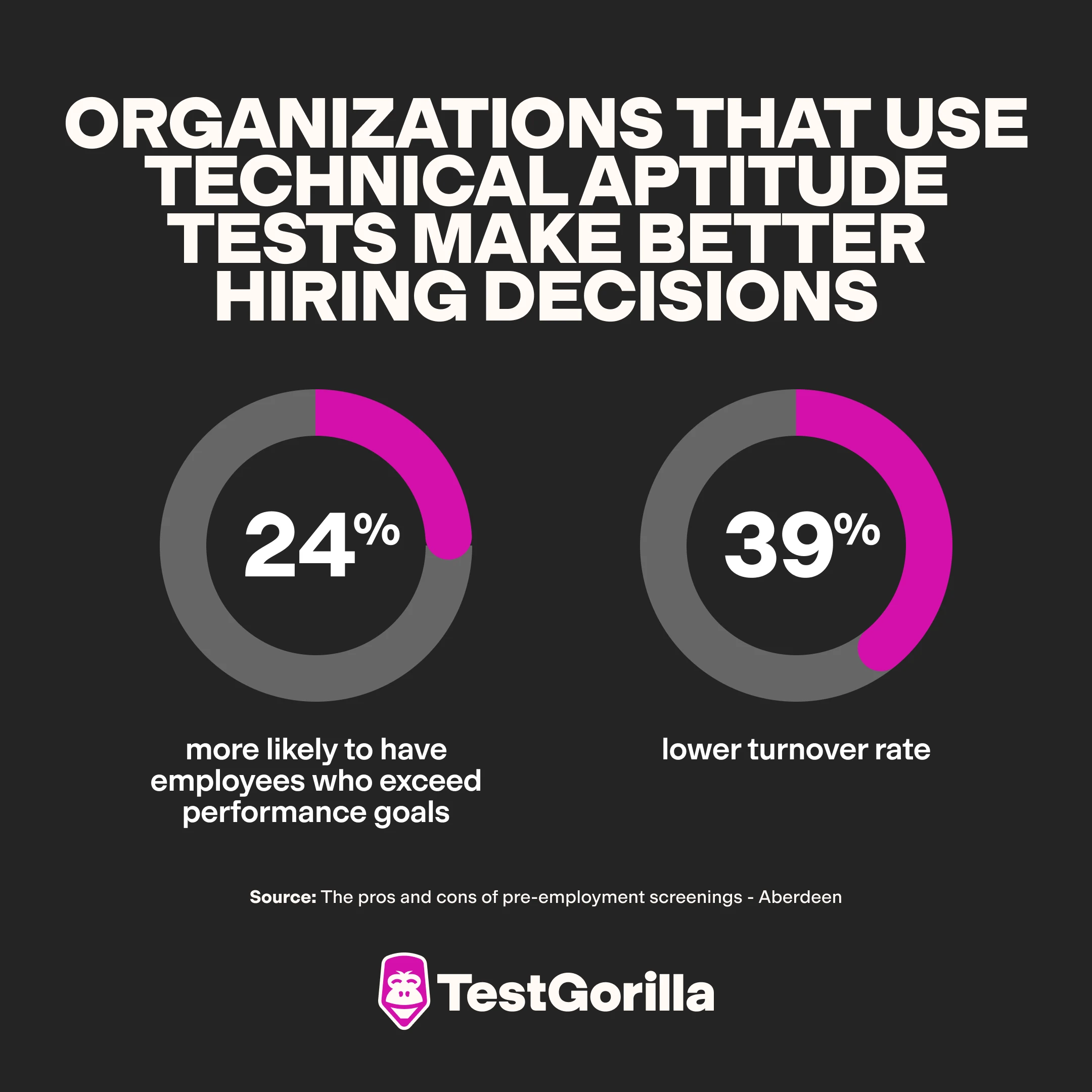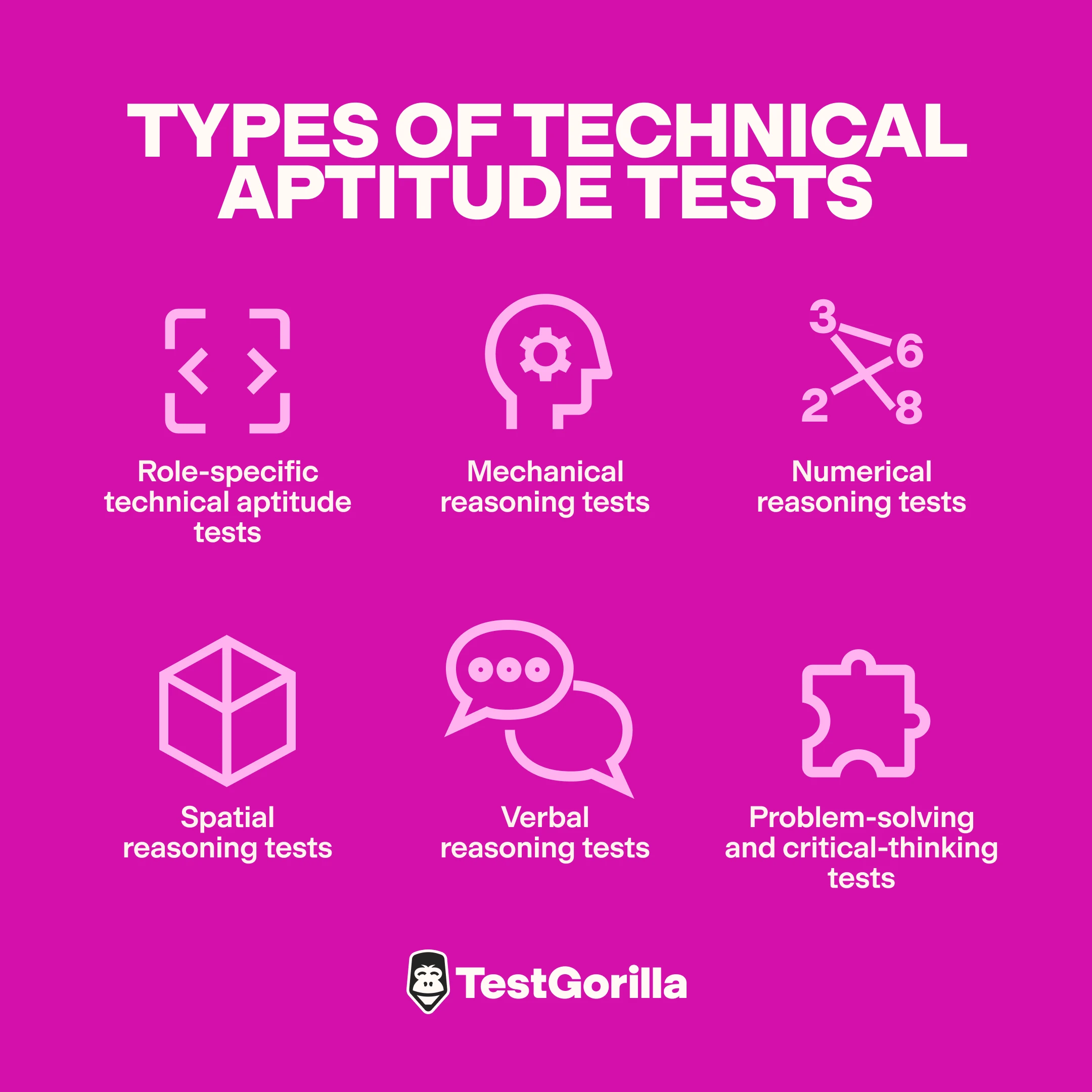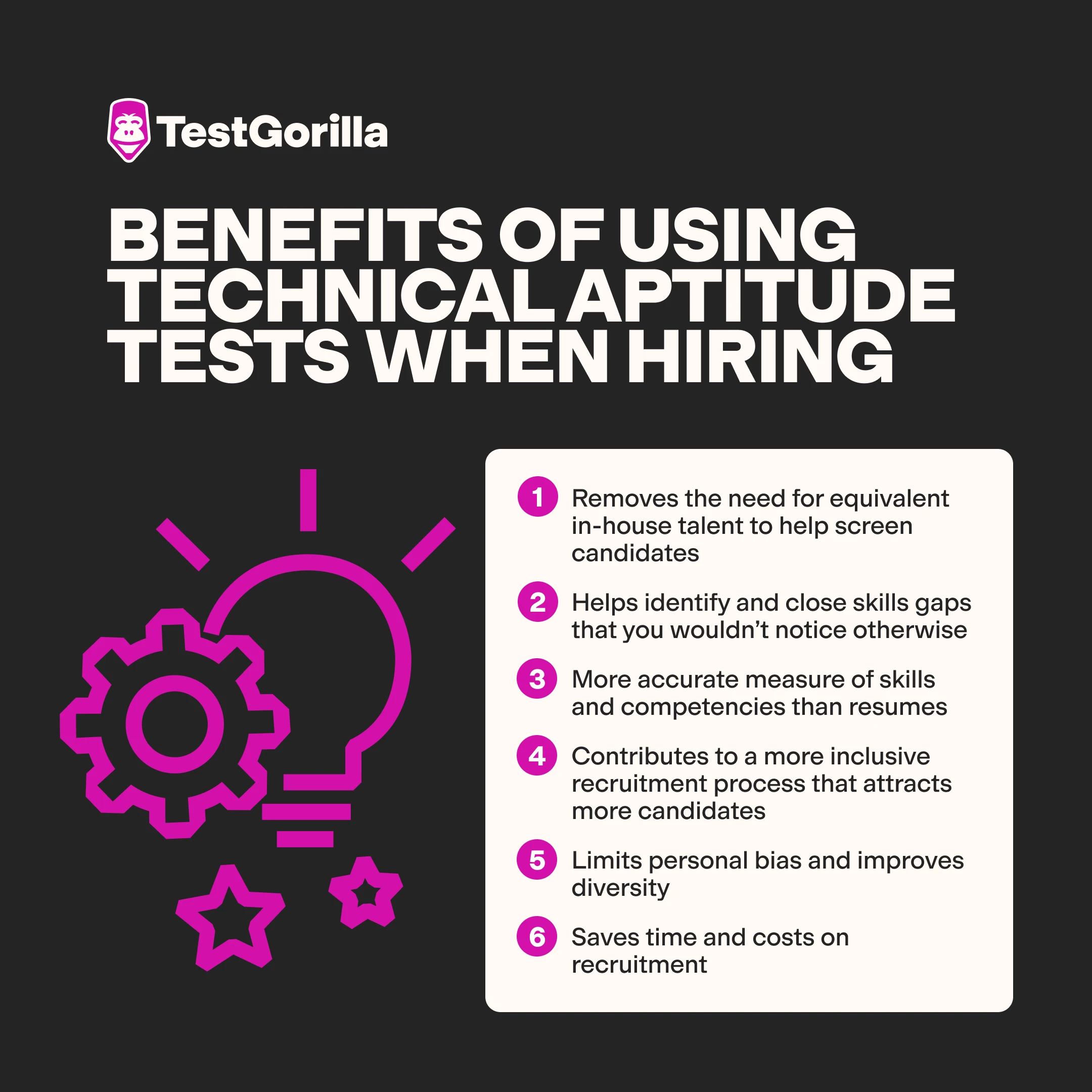Know the right candidate when you screen them with TestGorilla
Validating skills, competencies, and references is a challenge recruiters face when hiring for highly specialized roles.
Technical aptitude tests remove the need for companies to have the skills they’re screening for, cut the time it takes to find the right person and make the screening process easily repeatable.
They are useful for identifying candidates with strong technical aptitudes and are better at predicting role performance than resumes.
This guide explains where technical ability tests fit in skills-based hiring and helps you pick the most suitable candidate for any job role.
Table of contents
- What are technical aptitude tests?
- The 6 different types of technical aptitude tests
- Why is it important to use technical aptitude tests for employment?
- Use TestGorilla to add technical aptitude assessments to your hiring process
- How can you help your candidates prepare for technical aptitude tests?
- Use pre-employment technical aptitude tests to hire subject matter experts
What are technical aptitude tests?
A technical aptitude test is a tool used to screen candidates’ abilities and the technical skills required to succeed in the role. These pre-employment assessments examine industry knowledge and competencies and various reasoning skills needed to solve the types of problems the role involves, such as abstract reasoning and logical reasoning.
For example, a good technical aptitude test for leaders often includes the Leadership and People Management test combined with a critical-thinking or problem-solving test.
Screening with the right examinations is necessary for any position, particularly for highly specialized roles such as cloud or cybersecurity experts and software developers.
These types of roles are difficult to fill and always in demand because of the high turnover rate among technologists – for instance, 69% of software developers stay in their companies for less than two years.
The good news is these types of tests are part of the solution to better hiring decisions.
Research shows that organizations that use technical aptitude assessments for employment are 24% more likely to have employees who exceed performance goals and a 39% lower turnover rate.
The 6 different types of technical aptitude tests
All technical tests fall under the following six types – combine a few of them with other types of employment aptitude tests for your candidates' most thorough skills assessment.
1. Role-specific technical aptitude tests
Role-specific evaluations show applicants with the strong technical aptitude required to succeed. They are an integral part of any candidate screening process.
For instance, TestGorilla’s Coding: Data Structures - Binary Search Trees test is useful for screening technical roles like software engineers or database administrators.
It evaluates applicants’ proficiency in working with binary search trees and their ability to efficiently handle and organize data with practice questions like the one pictured below. To help you customize according to your needs, you can either configure which languages they need to use or let them choose if they aren’t English speakers.
Using this evaluation alongside a custom coding question or two in your assessment ensures you thoroughly cover this aspect of the candidate's technical aptitude skills examination.
The best part is that these tests don’t require you to have equivalent knowledge in-house because they’re developed by industry experts and scored automatically.
Let’s look at some other role-specific technical aptitude examples from different industries.
The Sales Aptitude test evaluates relationship-building and communication, persuasion, and adaptability using sales problem-solving questions like the one from TestGorilla’s preview below. These technical aptitude skills directly contribute to client satisfaction and positive performance.
A slightly different technical aptitude example is the Conducting Interviews test, which applies to various contexts and roles like marketing, sales, consumer research, and HR.
Rather than revolving around one specific position, this examination gauges candidates’ knowledge of how to develop and carry out interviews through relevant scenario-based questions such as this example:
To explore more preview questions, click here!
You can find a suitable evaluation for any position or role aspect you need to focus on in our test library.
2. Mechanical reasoning tests
A Mechanical Reasoning test evaluates applicants’ knowledge of basic mechanical concepts like velocity, pulleys, levers, gears, and wheels.
Candidates should score well on this test if they are applying for any of the following roles:
Facility maintenance staff
HVAC technicians
Equipment installation technicians
Electricians
Welders
Plumbers
Carpenters
Machine operators
Machinists
Automotive mechanics
Technical salespeople
Engineering roles, such as mechanical, electrical, aerospace, or civil engineers
Below is a sample question from TestGorilla’s Mechanical Reasoning test that you can use to assess the mechanical aptitude of applicants for any of these positions:
3. Numerical reasoning tests
A numerical reasoning test assesses candidates’ basic aptitude with numbers. Although a Numerical Reasoning test differs from a math test, applicants must know how to interpret numbers, percentages, and fractions, analyze graphs and charts, and understand number patterns and tables.
TestGorilla’s Numerical Reasoning test evaluates general aptitude for numbers and their interpretation with questions like the one pictured below:
Applicants who succeed on this technical test could be suitable for jobs like:
Auditors
Financial analysts
Accountants
Bookkeepers
Any other role that requires good numerical reasoning skills
4. Spatial reasoning tests
A Spatial Reasoning test shows candidates’ understanding of 2D and 3D objects in space. It tests their knowledge of concepts such as mental rotation, mental folding, spatial working memory, and spatial visualization with a series of questions like this:
To explore more preview questions, click here!
It’s imperative to give this test to candidates applying for any of the following roles:
Mechanical engineers
Chemical engineers
Researchers
Designers
Architects
Any other STEM jobs in your organization
5. Verbal reasoning tests
A Verbal Reasoning test evaluates a candidate's ability to make logical connections between words and draw accurate conclusions based on that information. It helps you determine if they can find analogies in text and understand premises and inferences, as shown in the preview below.
Any candidate applying to work in the following roles should complete a Verbal Reasoning test:
Legal positions
Engineering jobs
Consulting roles
Executive positions in any industry, especially in the financial and banking sectors
Civil service jobs, like legislators, teachers, and health care professionals
6. Problem-solving and critical-thinking tests
Problem-solving and critical-thinking tests evaluate candidates’ analytical skills and ability to interpret information, apply logic based on a given set of rules, prioritize tasks correctly, and form accurate conclusions.
The Problem Solving test helps you see how candidates break complex problems down into doable tasks and solve them. It’s useful for any role that involves managing shifting variables and tight deadlines. Here are some examples of such roles:
Administrative assistants
Project managers
Customer service managers
Web developers
People working in hospitality
Salespeople
Below is a sample question from the Problem Solving test, which helps you screen for any of the mentioned positions:
The Critical Thinking test examines applicants’ ability to make sound decisions using inductive and deductive reasoning skills: data interpretation, weighing arguments, fallacy recognition, and conclusion formulation.
It’s most useful for executive and leadership roles and any role involving independent decision-making. Examples include:
Analysts
Engineers
Executives
Lawyers
Marketers
Data scientists
Implement TestGorilla to remove bias from hiring
Talent assessments give all applicants an equal chance to prove their talents. Create a TestGorilla account for free to start basing your recruiting decisions on concrete, verified, and objective data and ensure you fill your open positions with the most suitable talent.
The best insights on HR and recruitment, delivered to your inbox.
Biweekly updates. No spam. Unsubscribe any time.
Why is it important to use technical aptitude tests for employment?
Recruiters agree that validating skills, competencies, and references is one of their biggest challenges.
Resumes are unreliable. People can lie on them or fail to optimize for keywords, making screening more difficult.
Even in the best-case scenario, resumes kick great talent out of your pool because they focus on education and experience, not skills, competence, and potential.
On the other hand, ad-hoc skills-based hiring is inefficient and time-consuming and requires a degree of knowledge in the field that you may not have available internally.
Even if you have sufficiently skilled hiring managers, their different interpretations of candidate answers and personal bias could lead to great talent slipping through the cracks.
This problem affected Solid Solutions Management, our client in the engineering software space. Since switching to science-backed talent assessments, the company saw massive improvements in its caliber of talent and retention rates and made its recruiting process consistent.
Adam Hartles, a Technical Services Manager with the company, references specific features as key to its success:
High integrity of the evaluations, which focus on candidate test results rather than specific technical answers
Secure question bank, which prevents leaks
Customization features within the assessment ensuring the most relevant skills for the role are front and center
The ability to easily combine quantitative technical tests with soft skills and personality tests for a rounded view of candidates
Technical assessment tests should be a part of talent screening for any role. These are the specific benefits of adding them to your recruitment process:
Technical Aptitude Test Benefit | Description |
Removes the need for equivalent in-house talent to help screen candidates | Technical tests are created by subject matter experts and automatically scored so you can rely on them to screen even the most specialized candidates, like cloud and cybersecurity experts or software developers. |
Helps identify and close skills gaps that you wouldn’t notice otherwise | Only 33% of executives completely understand the skills their IT teams need, and 68% of technologists say their leadership isn’t aware of a tech skills gap. With technical aptitude tests, executives don’t need to become IT experts themselves to notice gaps or upskill their IT talent. |
More accurate measure of skills and competencies than resumes | Technical aptitude assessments give you the comprehensive and accurate information you need to choose the best talent. Some platforms, like TestGorilla, offer anti-cheating settings for additional data integrity protection. |
Contributes to a more inclusive recruitment process that attracts more candidates | Many companies require previous experience and education, even for entry-level tech jobs. Employers that remove at least one of those requirements and replace them with technical aptitude tests see better results: 58% reported a recruitment process that attracts more candidates, enabling them to choose from more diverse talent pools. |
Limits personal bias and improves diversity | Technical aptitude tests enable all candidates to show their talents, making screening fairer and more objective. |
Saves time and costs on recruitment | Recruiters don’t have to spend hours reading resumes or becoming experts in their candidates’ fields to effectively hire. Technical tests take the same time to examine tens and hundreds of candidates, letting recruiters focus elsewhere. |
Use TestGorilla to add technical aptitude assessments to your hiring process
Technical aptitude tests should be the initial method of applicant screening – before you get to their resumes if you’re still using those.
This approach immediately shifts your focus to the most important part: the candidate’s skills and competencies required for the role.
You give everyone a fair chance to show their potential regardless of their previous experience, education, background, race, or gender.
Our research shows that multi-measure skills-based assessments are the most accurate predictors of job success. 91% of employers who use this method make quality hires every time, compared to 82% of employers who use skills tests (but not multi-measure) and just 67% of employers who don't use any form of skills testing.
That means that combined with personality and culture tests, technical aptitude assessments are the best way to screen and recruit for any role.
The holistic approach to skills-based hiring (including personality, culture, and technical tests) has many advantages:
Widens your talent pool
Objectively compares candidates
Increases your company diversity
Automates a portion of the hiring process
Improves candidate experience
Increases your quality of hires
Reduces the odds of mis-hires
Saves time and money on recruitment
Makes the screening process replicable and scalable
Want more specific data about the benefits of technical aptitude testing with TestGorilla? We have a recruitment ROI calculator that estimates your savings.
Hire the most technically competent and suitable person with TestGorilla
With technical aptitude tests, you don’t need to be a programming genius or trade law specialist to know one when you screen them. Sign up for a demo to see how TestGorilla helps you create multi-measure assessments that provide all the data you need to avoid mis-hires – technical and otherwise.
How can you help your candidates prepare for technical aptitude tests?
The most important way you can help candidates prepare for their technical assessment test is to communicate with them clearly throughout the hiring process.
Here are some ways you can manage expectations:
What to communicate | How it helps applicants |
Announce what you plan to test candidates for specifically in the job ad | Knowing what technical aptitude skills they need to succeed lets candidates self-identify and either proceed to apply or move on to more suitable opportunities, saving everyone time. |
Mention how long the test takes and what kind of questions to expect | These details help applicants plan to allocate sufficient time, manage anxiety levels, and present their best selves. |
Explain how the technical test helps you qualify candidates for the role | Information about your selection process provides insight into your company culture and values and helps candidates imagine what it would be like to work there. |
Invite applicants to request special accommodation options if needed (for non-fluent speakers and those with disabilities) | Providing accommodation gives an equal opportunity for all candidates and encourages them to show their skills. |
These practices also benefit the employer.
Jobvite’s annual report revealed that 95.1% of tech job seekers perceive company culture as important in their decision to apply for a job, and information gained from a recruiter is one of the ways they form an opinion about it.
Regardless of the industry, how you treat applicants says a lot about how you treat employees. Being appreciative and respectful of test-takers goes a long way for your employer's brand and future hiring options.
One last tip: Inform candidates that you may keep them in your talent pool if they aren’t selected for this position if you think they would generally be good additions to the company.
Use pre-employment technical aptitude tests to hire subject matter experts
Technical aptitude assessments are the most objective, reliable, and straightforward ways to evaluate candidate skills for the job, and they are best used alongside non-technical examinations.
With a test platform like TestGorilla, you don’t need to create your own technical tests or have the knowledge you’re screening candidates for. As our demo shows, you can browse the library and use the most relevant predeveloped tests for your open roles.
Take advantage of our product tour to learn how to create multi-measure talent assessments in three simple steps.
Sign up for your Free forever plan to get started.
You've scrolled this far
Why not try TestGorilla for free, and see what happens when you put skills first.
































